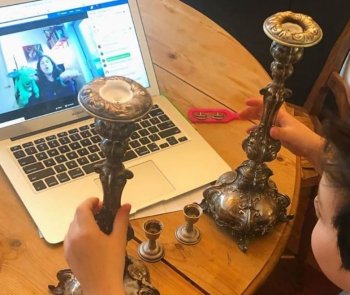What Early Childhood Educators Have Learned from Months of Distance Learning

A paradigm shift has taken place in our educational system and it’s been swifter than anyone could have imagined. Normally change like this takes time. A lot of time. In fact, schools are often criticized for being the slowest organizations at implementing any change at all!
However, Jewish school leaders and teaching staff have adopted whole new delivery systems on the fly. And while “empathy” is normally the first phase in the design thinking process for innovative thinking and creative problem solving, schools didn’t have the luxury of starting there. Instead, they jumped immediately into ideating and prototyping. Now we can learn from the early adaptors who experimented first.
So, no matter what “week/month” you are in implementing distance learning, we hope the following reflections and suggestions we’ve heard from early childhood educators all over the country inspire you and help ground your practice in the components that matter most now for children and their families – relationships, empathy, and joy.
- One-size does not fit all when it comes to families. Some families will want everything you can provide them while others may be completely overwhelmed. Listen and offer multiple ways to engage.
- Remain curious about children’s play behaviors and questions. Children learn no matter where they are and what they are doing. Their environments and their play gives us a window into children’s thinking and evolving worldview. Encourage input and questions as much as possible.
- Support teachers in finding their unique style and joy. Recognize the loss teachers are experiencing and help them work to their strengths. Some will thrive experimenting with new technology while others will find joy through old school tools like phone class and handwritten notes.
- Promote social and emotional interactions between children. Adjust your approach and activities so children missing their friends and the interactions they crave are supported. Try to eat lunch together as a class or set up small group play times.
- Extend your content and activities to home. Teachers need to be more creative now in seeing “home” as a strong component, the third teacher, in children’s learning experiences. What materials do children have access to in their own kitchens, pantries, garages, and yards? Invite students to see their homes through new eyes (shapes, sizes, textures, colors) and share their observations with classmates.
- Keep (or Establish New) rhythms and rituals. Begin and end each class in ways that children can anticipate. Predictable patters and repeated activities will help children feel less stress and more comforted.
- Without school walls you can think outside the box. Today’s digital formats opens the door for more collaboration locally and beyond. Forge short term partnerships with other schools, or invite educators from bookstores, nature centers, and museums to help plan a unique digital experience for the students.
Now that the transition phase is over, many educators are wondering what they should be focusing on next. While the Jewish holidays of Passover and Yom Ha’Atzmaut and now Shavout helped to guide and center educators temporarily around content areas, it’s now time to revisit your own mission statements and vision for children’s’ care and education. We hope you’ll be able to add the suggestions offered here to your guidepost for moving forward.
Remember that your values and Jewish lenses haven’t changed, only the tools you have to engage and connect. Show appreciation, guide, support, and celebrate individually and as a community of learners.
Shariee Calderone is a Senior Educational Consultant for Early Childhood and Family Engagement at The Jewish Education Project. Along with her colleagues, she is listening carefully to the needs and concerns of directors of schools, facilitating communal conversations, and gathering resources to help them navigate their way through uncharted waters.